Megan Clancy Interview with John C. McGinley
September 13th, 2015 by Global Down Syndrome Foundation
Beau Bridges And Minka Kelly Join Global Down Syndrome Foundation Fashion Show
September 11th, 2015 by Global Down Syndrome Foundation
Around Annapolis: Young model shows ‘to be beautiful you have to be yourself
September 10th, 2015 by Global Down Syndrome Foundation
Crnic Institute Selects World-Class Researcher
September 9th, 2015 by Global Down Syndrome Foundation
Crnic expands and strengthens with new Associate Director, Dr. Joaquin Espinosa. This addition creates the largest team of Down syndrome researchers in the world.
Global Down Syndrome Foundation Will Help Fund Espinosa’s Vision as the Newly Appointed Associate Director of Science
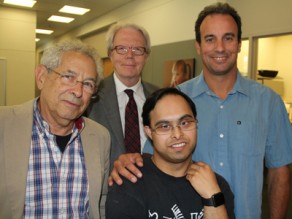
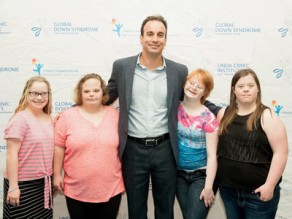
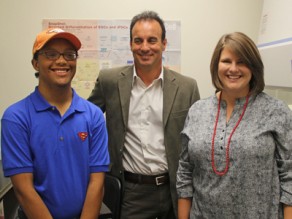
Acclaimed cancer medical researcher, professor and scientist Joaquín Espinosa, Ph.D., has been appointed to the newly created position of Associate Director for Science at the Linda Crnic Institute for Down Syndrome at the University of Colorado Denver School of Medicine (UCD-SOM) in the Anschutz Medical Campus.
Tom Blumenthal, Ph.D., Executive Director of the Crnic Institute commented, “There were other departments and centers vying to hire Joaquín but in the end it was the allure and potential of Down syndrome research that convinced him to join us. In this position, he knows he has the chance of helping millions of people. Joaquín is not only a cancer expert he is a brilliant and big idea scientist. He is an expert in the basic molecular biology of gene expression, and an accomplished genomicist. We are lucky to have him.”
Espinosa’s team (The Espinosa Lab) has moved from the University of Colorado Boulder to the Department of Pharmacology at UCD-SOM in Aurora, where Espinosa will hold a full professorship. His team will continue investigating diverse cancer genes, while also focusing on the remarkable fact that the population with Down syndrome has a much lower risk of developing solid tumors.
In his new position overseeing science at the Crnic Institute, Espinosa is tasked with expanding beyond the existing Crnic Grand Challenge Grants program that has stimulated 28 labs and nearly 100 scientists to work on Down syndrome research at the University of Colorado. He will foster growth in key areas such as Alzheimer’s disease, cancer, autoimmune disorders and clinical research in association with the Sie Center for Down Syndrome at Children’s Hospital Colorado. He will also work on establishing public-private-university alliances to stimulate research that benefits people with Down syndrome.
Global Down Syndrome Foundation, the fundraising, education and outreach arm of the Crnic Institute, helped raised funds to enable the recruitment of Espinosa and will make fundraising for his scientific vision a priority.
“The Global Down Syndrome Foundation is proud to have Dr. Joaquín Espinosa join our prestigious group of scientists at the Crnic Institute for Down Syndrome,” said Michelle Sie Whitten, President and CEO of the Global Down Syndrome Foundation. “The combination of his scientific achievements and his passion for helping people with Down syndrome makes Dr. Espinosa a perfect fit for our Global family.”
“I am very excited to join the Crnic Institute and work in collaboration with the teams at the Sie Center and Global Down Syndrome Foundation,” said Espinosa. “It is rare to find this perfect combination of a research institute, a clinical care operation and a powerful non-profit agency working in close coordination toward a common goal. I am confident that we will advance biomedical research in the area of Down syndrome and the associated co-morbidities in major ways.”
Previously Espinosa held the position of Associate Professor of Molecular, Cellular and Developmental Biology at the University of Colorado Boulder, where he will continue as a Visiting Associate Professor. He will also continue as the University of Colorado’s Director of The Functional Genomics Facility and as the Co-Leader of the Molecular Oncology Program at the University of Colorado Cancer Center.
Espinosa obtained his Ph.D. from the University of Buenos Aires in Argentina and did post-doctoral training at The Salk Institute for Biological Studies in La Jolla, California. In 2009, he was appointed as an Early Career Scientist of the Howard Hughes Medical Institute, a nonprofit medical research organization that plays a powerful role in advancing biomedical research and science education in the United States.
In addition to being an advocate for people with Down syndrome, Espinosa is also a contributor to The Huffington Post, an avid rock climber, skier and outdoorsman.
Global Down Syndrome Foundation is a public non-profit dedicated to significantly improving the lives of people with Down syndrome through research, medical care, education and advocacy. Formally established in 2009, Global’s primary focus is to support the Linda Crnic Institute for Down Syndrome, the first academic home in the United States committed solely to research and medical care for people with Down syndrome. Headquartered at the University of Colorado School of Medicine on the Anschutz Medical Campus, the Crnic Institute includes the Anna and John J. Sie Center for Down Syndrome at the Children’s Hospital Colorado.
Follow Global Down Syndrome Foundation on Facebook & Twitter @GDSFoundation.
Beau Bridges and Minka Kelly Support Global
September 9th, 2015 by Global Down Syndrome Foundation
 |
||
| Saturday, October 24, 2015 New Venue! – Colorado Convention Center 2015 EMMY© NOMINEE BEAU BRIDGES AND MINKA KELLY Bridges, a three-time Emmy winner, received his 15th Emmy nomination this year for his role as the suppressed provost Barton Scully in Showtime’s “Masters of Sex” series. Part of a preeminent Hollywood acting dynasty, the acclaimed actor has portrayed a myriad of film and television characters during his successful career spanning more than three decades. He also directed and starred in “The Kid From Nowhere,” the dramatic tale of a remarkable young man with Down syndrome who gains self-esteem while training for the Special Olympics. Kelly is best-known for her roles on Friday Night Lights, Parenthood and Charlie’s Angels, she most recently starred in the Fox network series “Almost Human.” She also portrayed Jacqueline Kennedy Onassis in the critically acclaimed film The Butler opposite Oprah Winfrey. The Global Down Syndrome Foundation Be Beautiful Be Yourself Fashion Show benefits the Linda Crnic Institute for Down Syndrome on the Anschutz Medical Campus and the Sie Center for Down Syndrome at Children’s Hospital Colorado Saturday, October 24, 2015 To learn more about the Be Beautiful Be Yourself Fashion Show, go to BeBeautifulBeYourself.org To learn more about sponsorships, contact Global’s Development Team at |
||
 |
||
| Add Event to Calendar: Outlook – Google – Yahoo – Outlook.com – Apple Calendar |
||
|
|
||
| Connect with the Global Down Syndrome Foundation online: | ||
|
Who Knew? Alec Baldwin is a Pretty Serious Philanthropist
September 9th, 2015 by Global Down Syndrome Foundation
Global AD-DS Grantee Publishes Research
September 8th, 2015 by Global Down Syndrome Foundation

Karen Chang, PhD uses $300,000 grant co-funded by Global, Crnic Institute and Alzheimer’s Association to examine age-dependent memory loss
Global is dedicated to supporting research focused on the important relationship between Alzheimer’s disease and Down syndrome. To this end, Global has co-organized and co-funded the Down Syndrome-Alzheimer’s Disease Investigator Program with the Crnic Institute and the national Alzheimer’s Association.
In 2013, Karen T. Chang, PhD, received one of the grants and was awarded $300,000 to study the functional protein interactions in Alzheimer’s disease and Down syndrome.
In August of 2015, the results of the research co-funded by Global were published in the distinguished publication The Journal of Neuroscience. Chang along with Jillian L. Shaw and Shixing Zhang used fruit flies to study the mechanisms underlying age-dependent memory impairment. Their results show the fly homolog of the Down syndrome critical region 1 is important for normal short-term memory (STM) and interacts genetically with the amyloid-precursor protein (APP) to protect against APP-induced STM defects. In addition, the results indicate that Nebula upregulation also effectively protects against APP-induced long-term memory defects.
The scientific world now understands nearly all people with Down syndrome will have the “brain pathology” of Alzheimer’s disease by the time they are in their 40s (i.e. they will have the plaques and tangles in their brain that appear in the brains of typical people with Alzheimer’s disease). The question intriguing the scientific field is why only an estimated 50 percent will get the actual symptoms of dementia associated with the disease. If scientists can understand what is protecting this population from dementia they may be able to identify targets or even a cure for Alzheimer’s disease.
In 2012, Global helped to recruit the world renowned Alzheimer’s disease scientist, Huntington Potter, PhD to the Crnic Institute. Dr. Potter is integral to the collaboration with the national Alzheimer’s Association. In addition, Global helped Dr. Potter to establish the Rocky Mountain Down Syndrome Alzheimer’s Disease Research Center with a subspecialty in Down syndrome.
Donate to the important Alzheimer’s Disease Initiatives
supported by the Global Down Syndrome Foundation.
Congress Poised for a Vote on Education Reform This Fall
September 8th, 2015 by Global Down Syndrome Foundation
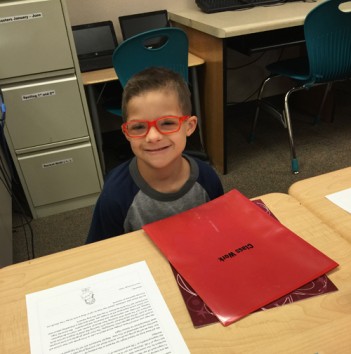
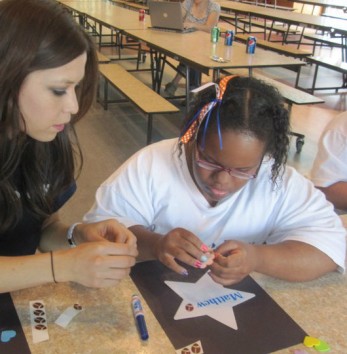

Congress Poised for a Vote on Education Reform This Fall
The U.S. Senate and House of Representatives have each passed versions of bills that have the potential to vastly change public education for children who are differently-abled, including those with Down syndrome. Here’s what parents and advocates need to know.
Since 2007, Congress has been looking to reauthorize the Elementary and Secondary Education Act (ESEA), a law that has existed since 1965 but was most recently reauthorized in 2002 as the No Child Left Behind Act. Widely unpopular, No Child Left Behind has been criticized for taking an outdated approach to education and for applying federally mandated, one-size-fits-all teaching and accountability standards that don’t work for all children.
In July 2015, the House of Representatives passed H.R. 5, the Student Success Act (SSA), and the Senate passed the Every Child Achieves Act (ECAA) as answers to the problems of No Child Left Behind. Both bills would give states and individual schools more control over teaching standards and hold them more accountable for student success.
The Senate’s ECAA passed with a strongly bipartisan vote of 81-17, while the House’s more partisan SSA barely passed with a vote of 218-213. Although SSA had strong Republican support, no Democrats voted for it.
The Title I Debate
One of the biggest differences between the two bills is Title I portability, or how schools receive funding for students who are differently-abled.
Title I is the section of ESEA that requires schools to provide a high-quality education to children “at a significant disadvantage,” whether physical, developmental, or socioeconomic. The title outlines standards schools must meet so these disadvantaged students achieve the same academic standards as their peers. It’s also the section of ESEA that defines failing or low-achieving schools.
The federal government allocates a certain amount of money each school year, known as Title I funds, to help schools meet these requirements and also avoid earning a failing grade. Title I funds must be used for very specific purposes and, depending on the school, may be used only for designated groups of students. Currently, those funds are distributed to districts that serve a high number of students with special needs, a classification that includes students who are differently-abled and those with Down syndrome.
The Senate’s ECAA doesn’t include any changes to this funding structure, but the House’s SSA does. Under the SSA’s proposals, instead of being calculated based on the number of such students in a school district, the funds would be calculated based on how many attend a given school. That money would also become portable — if a student changed schools, the money allocated for him or her under Title I would follow.
Democrats oppose this, arguing that Title I funds would wind up in well-performing schools and leave poorly performing schools without the money they need to improve. Republicans see Title I portability as a way to grant parents more choice in what school their child attends and as a solution to some of the barriers schools face in how those funds are used.
Read More: A History of Down Syndrome Human and Civil Rights
Improvements Possible With Both Bills
Despite the disagreement over Title I funding, both bills are viewed as an improvement over the current ESEA. In addition to giving states and local school districts accountability for student success, the bills:
• Require states to set levels of achievement for all students, including those who are differently-abled; the SSA would let states set one single achievement standard for all students, while the ECAA would charge states with developing low, middle, and high level standards.
• Include students who are differently-abled in mandated reading, math, and science assessments
• Allow states to develop their own teacher evaluation programs and provide resources to improve the professional development of teachers
What’s Next?
This fall a conference committee will try to reconcile the two bills into one. Legal experts believe the ECAA stands the greatest chance of becoming law. However, the White House, civil rights groups, education associations, and key politicians all want to make changes to the way ECAA handles accountability before taking the next step — and Republicans say they will not support a reauthorization of ESEA without Title I portability.
Follow Global Down Syndrome Foundation on Facebook and Twitter for the latest developments on ESEA reform. You can also follow the conversation on social media using #ESEA, #ECAA, and #HR5.
Scientists Find Link Between Down Syndrome And Alzheimer’s
September 3rd, 2015 by Global Down Syndrome Foundation
August 2015 Newsletter
August 16th, 2015 by Global Down Syndrome Foundation
Self-advocates Meet First Lady in DC; Jamie Brewer, Quincy Jones Award Recipient; Alzheimer’s-DS Workshop; First Crnic Institute Grad Fellowship; 21st Century Cures Act and More!







 Experience our inspirational and groundbreaking videos and photos. Our children and self-advocates are beautiful AND brilliant!
Experience our inspirational and groundbreaking videos and photos. Our children and self-advocates are beautiful AND brilliant! Make sure your local Representatives are on the Congressional Down Syndrome Task Force.
Make sure your local Representatives are on the Congressional Down Syndrome Task Force.